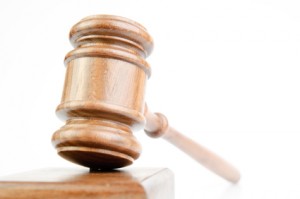 Subrogation attorneys dealing with a high volume of automobile cases often have to litigate cases “on the fly.” Policyholders can be tough to reach and often all the attorney has going into trial is the adjuster’s notes, which range in depth and quality of description. However, occasionally the job is made easier by a traffic case having arisen out of the same incident. The internet provides the Virginia subrogation attorney with a powerful tool: online case records search. A quick search before trial will reveal whether the defendant plead guilty, or was found guilty, of a traffic offense. So what can the Virginia subrogation attorney do with the judgment? VA Code §8.01-389(A1) allows the introduction of said judgment as prima facie evidence. The statute requires the records be “authenticated” by the clerk of the court where it was preserved.
Subrogation attorneys dealing with a high volume of automobile cases often have to litigate cases “on the fly.” Policyholders can be tough to reach and often all the attorney has going into trial is the adjuster’s notes, which range in depth and quality of description. However, occasionally the job is made easier by a traffic case having arisen out of the same incident. The internet provides the Virginia subrogation attorney with a powerful tool: online case records search. A quick search before trial will reveal whether the defendant plead guilty, or was found guilty, of a traffic offense. So what can the Virginia subrogation attorney do with the judgment? VA Code §8.01-389(A1) allows the introduction of said judgment as prima facie evidence. The statute requires the records be “authenticated” by the clerk of the court where it was preserved.
Practically, in most instances if the trial time gives the attorney some time to get into the clerk’s office before court then getting to court 30 minutes early or more will allow time to get a certified copy from the clerk. Most of the time the citation or case was litigated in the traffic court of the same jurisdiction in which the present civil case is being tried. Obviously, if it is a different court, or if trial time is first thing in the morning, counsel may have to go by court before he trial on another day or request it by mail if the clerk’s office obliges.
Chaplin & Gonet Goes International…

In celebration that is. Back from the celebratory cruise, the law firm of Chaplin & Gonet is refreshed and back hard at work again. Our collection professionals are hoping to exceed last year’s collection goals and continue the globe-trotting. If you have a business, hospital or are in need of collection services on accounts receivable contact Chaplin & Gonet today to learn what makes us the premier collection firm in Virginia.
Chaplin & Gonet Sets Sail for the Bahamas

In celebration of meeting their collection goals for the year, staff at the law firm of Chaplin & Gonet have been rewarded by setting sail to the Bahamas! The firm broke all historical collection records and demonstrates the determination of Chaplin & Gonet to collect on behalf of subrogation and collection clients.
As a result the office will be closed May 24 through May 29. All voice mails and emails will be answered promptly upon re-opening. If you would like to put Virginia’s premier subrogation and collection firm to work for your company contact us today.
Medical Bills for Personal Injury in Virginia
 Every Virginia subrogation attorney knows how important medical bills, and their introduction into evidence, are for their day-to-day practice. Often times in automobile subrogation the medical bills far exceed any damages to the car. This article confronts the confusing evidentiary “Venn diagram” of Virginia law concerning medical bills and their admission into evidence. Virginia subrogation attorneys need to understand how the differing statutes and case law overlap and be prepared for objections from opposing counsel. Each source of law will be examined in turn and then the article will conclude with a brief discussion of their overlap, interaction and trial strategies for the Virginia subrogation attorney bringing a personal injury action.
Every Virginia subrogation attorney knows how important medical bills, and their introduction into evidence, are for their day-to-day practice. Often times in automobile subrogation the medical bills far exceed any damages to the car. This article confronts the confusing evidentiary “Venn diagram” of Virginia law concerning medical bills and their admission into evidence. Virginia subrogation attorneys need to understand how the differing statutes and case law overlap and be prepared for objections from opposing counsel. Each source of law will be examined in turn and then the article will conclude with a brief discussion of their overlap, interaction and trial strategies for the Virginia subrogation attorney bringing a personal injury action.
The Law
The first relevant statute is VA Code § 8.01-413.01 titled “Authenticity and reasonableness of medical bills; presumption.” The statute states:
A. In any action for personal injuries, wrongful death, or for medical expense benefits payable under a motor vehicle insurance policy issued pursuant to § 38.2-124 or § 38.2-2201, the authenticity of bills for medical services provided and the reasonableness of the charges of the health care provider shall be rebuttably presumed upon identification by the plaintiff of the original bill or a duly authenticated copy and the plaintiff’s testimony (i) identifying the health care provider, (ii) explaining the circumstances surrounding his receipt of the bill, (iii) describing the services rendered and (iv) stating that the services were rendered in connection with treatment for the injuries received in the event giving rise to the action. The presumption herein shall not apply unless the opposing party or his attorney has been furnished such medical records at least twenty-one days prior to the trial.
This code section closely mirrors the language in McMunn v. Tatum, 237 Va 558, 379 S.E.2d 908 (Va. 1989) (hereinafter McMunn v. Tatum), which allows parties to introduce medical bills into evidence by laying a foundation through a lay witness. On its face, this statute allows attorneys to get in records without dealing with reasonableness or authenticity objections as long as copies of the records are sent to opposing counsel 21 days before trial. For most cases, if the Virginia subrogation attorney gets the records to opposing counsel within the 21 days, then there are usually no issues at trial. However, with a careful reading of Mcmunn v. Tatum, opposing counsel can trip up a Virginia subrogation attorney with an authenticity objection. A brief look at the holding in McMunn v. Tatum will prove instructive before discussing its impact upon VA Code § 8.01-413.o1.
McMunn v. Tatum was an appeal from a malpractice suit brought against a dentist. The case examined two evidentiary issues: (1) whether a plaintiff’s testimony that he has received bills regular on their face and consistent with his testimony as to his injuries and treatment is sufficient to show that the bills “came from the sources claimed” and (2) that the introduction of bills of the kind described above is “some evidence” that they are reasonable in amount. The Supreme Court of Virginia held the following:
A plaintiff may offer medical bills through the plaintiff’s testimony alone if he lays a foundation showing (1) that the bills are regular on their face, and (2) that they appear to relate to treatment, the nature and details of which the plaintiff has explained. If the defendant challenges the authenticity of the bills, they will be insufficient in themselves to create a jury issue, and independent proof of authenticity will be necessary. If the defendant challenges only their quantitative reasonableness, a jury issue is created on that question. The jury may then consider the bills as “some evidence” of their quantitative reasonableness, to be weighed against such evidence as the defendant may present on that question. If the defendant contests their medical necessity or causal relationship and further represents to the court that the defense will offer evidence on those issues, the bills will be insufficient in themselves to create a jury issue, and expert foundation testimony will be prerequisite to their admission.
The majority opinion contains an important footnote tempering the above requirements: “The issues of medical necessity and causal relationship are substantially uncontested where a defendant who intends to offer no evidence on those issues merely objects to the medical bills for the purpose of “putting the plaintiff to his burden of proof.” This important footnote is an invaluable arrow in the Virginia subrogation attorney’s quiver. In Virginia General District Court cases, where neither party wants to spend money on expert witnesses, McMunn v. Tatum stands for the proposition that plaintiffs may introduce medical bills into evidence by testimony without much worry as to reasonableness nor medical necessity objections.
One could be forgiven for looking at both VA Code § 8.01-413.01 and McMunn v. Tatum and concluding between case law and the above-mentioned statutes Virginia subrogation attorneys have the process of introducing medical bills into evidence pretty much covered. However, there is another key statute dealing directly with the introduction of medical bills in General District Court (courts not of record) or Circuit Court, where the defendant appeals: VA Code § 16.1-88.2, titled “Evidence of medical reports or records; testimony of health care provider or custodian of records.” This code section predates the Supreme Court handing down McMunn v. Tatum, in fact, the Supreme Court cites VA Code § 16.1-88.2 in its majority opinion.
The relevant section of VA Code § 16.1-88.2 states:
In a civil suit tried in a general district court or appealed to the circuit court by any defendant to recover damages for personal injuries or to resolve any dispute with an insurance company or health care provider, either party may present evidence as to the extent, nature and treatment of the injury, the examination of the person so injured and the costs of such treatment and examination by a report from the treating or examining health care provider as defined in § 8.01-581.1 and the records of a hospital or similar medical facility at which the treatment or examination was performed. Such medical report shall be admitted if the party intending to present evidence by the use of a report gives the opposing party or parties a copy of the report and written notice of such intention 10 days in advance of trial and if attached to such report is a sworn statement of the treating or examining health care provider that: (i) the person named therein was treated or examined by such health care provider; (ii) the information contained in the report is true and accurate and fully descriptive as to the nature and extent of the injury; and (iii) that any statement of costs contained in the report is true and accurate. Such hospital or other medical facility record shall be admitted if attached to it is a sworn statement of the custodian thereof that the same is a true and accurate copy of the record of such hospital or other medical facility.
A careful read of VA Code § 16.1-88.2 reveals language that echoes both the verbiage in McMunn v. Tatum and VA Code § 8.01-413.01, but with one key difference: the foundation is laid by the treating health care provider(s) by sworn affidavit. By obtaining an affidavit from the treating health care provider(s) and sending a copy of the records and affidavit to opposing counsel 10 days before trial Virginia subrogation attorneys seem to be guaranteed their admission into evidence. Authenticity concerns are dealt with by requiring a sworn statement by the custodian that the bill(s) are a true and accurate copy.
What does it all mean?
If in General District Court the Virginia subrogation attorney would be best suited to follow the requirements of VA Code § 16.1-88.2. However, given the difficulty in obtaining timely responses from medical providers it may not be an option. Then, one can look to VA Code § 8.01-413.01 and McMunn v. Tatum to almost guarantee the admission of the required medical records. However, there is still one problem area facing both General District Court and Circuit Court plaintiffs traveling the path of VA Code § 8.01-413.01: authenticity. A defense attorney can raise an objection to authenticity, given the medical records are almost always copies, and possibly keep the records out. This last hurdle can be overcome by the diligent Virginia subrogation attorney who satisfies the requirements set out in VA Code § 8.01-413(A), which states the following:
A. In any case where the hospital, nursing facility, physician’s, or other health care provider’s original records or papers of any patient in a hospital or institution for the treatment of physical or mental illness are admissible or would be admissible as evidence, any typewritten copy, photograph, photostatted copy, or microphotograph or printout or other hard copy generated from computerized or other electronic storage, microfilm, or other photographic, mechanical, electronic or chemical storage process thereof shall be admissible as evidence in any court of this Commonwealth in like manner as the original, if the printout or hard copy or microphotograph or photograph is properly authenticated by the employees having authority to release or produce the original records.
In short, if the Virginia subrogation attorney can produce an affidavit from the custodian of records at the institution where the plaintiff received medical care that the copies are authentic, then they are admissible. The Virginia subrogation attorney can keep this all straight by remembering that whenever the absolute right to admissibility granted by VA Code § 16.1-88.2 is unavailable they should look to the protections offered by VA Code § 8.01-413.01 and McMunn v. Tatum for both reasonableness and necessity and VA Code § 8.01-413(A) to sew up authenticity issues. Medical bills rest upon a three legged stool in Virginia, the legs are: reasonableness, necessity and authenticity; if any one leg is missing your whole Virginia subrogation case may fall down.
Editor:
Justin McLeod, Esq.
Associate
Chaplin & Gonet
